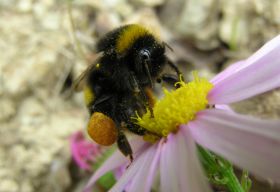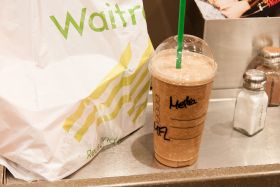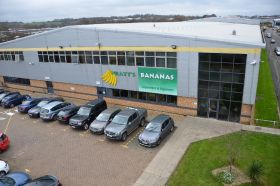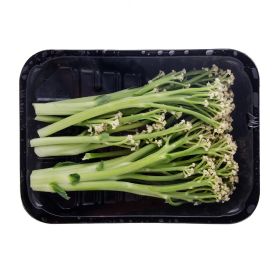Fresh Produce News
A petition aiming for 100,000 signatures is calling for a greater blanket ban of neonics, while a bee species returns to Lincolnshire
Almost 90,000 people have signed a petition calling for the government to clamp down on the neonicotinoid ban following a ruling that allowed four counties to use limited amounts of the pesticide.

The petition, which wants a complete ban on neonics pesticides to be maintained and enforced by government, will be considered for parliamentary debate if it reaches 100,000 signatures by the closing date which is the end of January 2016.
Three neonics were banned for two years for use on flowering crops in December 2013, following concerns over harmful effects on pollinators.
Farming bodies and other agriculture stakeholders disputed the decision, and this year Defra allowed four counties to use neonicotinoid-treated rape seed following lobbying from the NFU.
The petition is named ‘Don’t kill our bees! Immediately halt the use of neonicotinoids on crops’ and argues that neonics should be banned because they are harmful to pollinators.
The news comes as the Andrena Nitida bee species was spotted in Lincolnshire, after not being seen in the area since 1900.
It was found on a new Syngenta Operation Pollinator habitat area, created by Beeswax Farming, which is owned by hoover tycoon Sir James Dyson.
Bee entomology specialist Mike Edwards described the find as “very encouraging”. “It is very encouraging that habitat creation on farmland is helping some of these solitary bee species to recover in numbers, and to extend their range across the UK,” he said.
“Andrena nitida is one of the many solitary mining bee species that play such an important part in pollinating crops and wildflowers. They look very much like honeybees. However, their behaviour on flowers, and the fact they carry large amounts of dry pollen as they fly from flower to flower, makes them extremely efficient pollinators.”
The Jaffa Juniors tour, which launched in April 2015 in tandem with the Tesco Eat Happy scheme, has worked with 5,000 children
An initiative launched by citrus specialist Jaffa in conjunction with the Tesco Eat Happy Project is celebrating after reaching a rather significant milestone in its educational program.

The Jaffa Juniors tour, which launched in April 2015, has put its 5,000th child through the scheme as it undertook lessons at Grimsargh St Michael’s Church of England School in Preston, Lancashire.
Roy Van Grevenbroek, of Jaffa, said: “The Jaffa Juniors tour was launched because as a brand we recognise the importance of education to children of where their food comes from and how it is made..
“The tour was launched in conjunction with the Tesco Eat Happy project and is a great way of interacting with kids on a 1-2-1 and group basis and getting over the importance of fresh produce in our everyday diets.”
The lessons are aimed at Key Stage 1 and 2 children covering infant schools nationwide, and were developed in conjunction with education resource specialists TTS.
Van Grevenbroek added: “It is important that we educate from an early age to build the recognition through teens and into early adulthood.
“The tour has been successful in doing just that and is a testament to both the support given by the Tesco Eat Happy project and the schools themselves for being open to this outside interaction. As a brand we have made an ongoing commitment to the program which will extend into 2016 and beyond.”
The Jaffa brand was formed over 50 years ago in Israel. The brand is imported by Israeli grower/exporter Mehadrin, and distributed to Tesco stores in the UK via AMT.
Underlying profits for the first half of its financial year were £354 million, 55% down on the same period last year
Tesco has endured a further fall in profits.

Underlying profits for the first half of its financial year were £354 million, 55% down on the same period last year.
Its pre-tax profit was £74m, compared with a loss of £19m for the same period a year ago.
UK like-for-like sales were down 1.1% in the second quarter, an improvement from the first quarter’s fall of 1.5%. International sales were up 1%
In February, Tesco reported the worst results in its history, with a record statutory pre-tax loss of £6.4bn for the year to the end of February 2015.
Chief executive Dave Lewis said: “In the UK, we continue to improve all aspects of our offer for customers, resulting in volume growth which is allowing us to create a virtuous circle of investment.
“Our transformation programme in Europe has accelerated growth and reduced operating expenses, and in Asia, we have increased market share in challenging economic conditions.”
The supermarket is still under a criminal investigation by the Serious Fraud Office (SFO) after it admitted overstating its profits by £263m nearly a year ago.
Tesco’s Q2 results, David Gray, retail analyst at Planet Retail, said: “As expected, the numbers this morning indicate further signs of stabilisation at Tesco’s domestic unit, with like-for-like declines narrowing on those reported at Q1. There were also encouraging signs on volumes at Tesco, indicating this is a volume-led recovery.
“These figures have firmly cemented the split in the UK mid-market into two camps – Tesco/Sainsbury’s showing signs of recovery and Asda/Morrisons being the laggards. Considering Tesco was in the throes of the accounting scandal just 12 months ago, being in the former camp is an achievement in itself.
“Despite positive numbers in CEE, problems are persisting in Asia where like-for-likes remained flat in Q2 – an improvement, yes, but not stellar growth. Although Tesco’s Chairman has recently reaffirmed its commitment to the geographies in which it now trades, long-term disposals could still be on the cards considering the relative weakness in the company’s balance sheet and the lack of a dunnhumby sale.
“With Korea already culled, Malaysia is the obvious next market at risk with limited growth potential. However, it is profitable and well-established and so could command a decent price. In CEE, markets like Poland would generate the largest windfall considering its size relative to neighbouring markets and the presence of a string of international operators that could be would-be buyers. Most of these aforementioned markets look safe – for now at least.”
Asda, Iceland, Morrisons and Waitrose will donate money from new plastic bag levy to help fund new dementia research centre

In a rare instance of retailers working together, four of the UK’s major supermarkets have collaborated in a new charity initiative relating to the new “5p charge” on plastic bags
Asda, Iceland, Morrisons and Waitrose have pledged funds from the new levy to support the construction of a new dementia research centre at UCL university in London.
In addition to committing funds from their own stores, the four chief executives are today writing to their counterparts at all other UK food retailers, urging them to lend their support either this year or over the next five years.
With a total investment of £350 million, the proposed research centre currently has a funding shortfall of £100m, and the cash generated by carrier-bag sales in food retailers across Britain has the potential to bridge much of that gap.
The new centre aims to help the G8 Group challenge to find a cure for dementia by 2025.
Morrisons shop floor staff will now be paid £8.20 an hour, above the new national living wage of £7.20 after the review of salaries.
Morrisons has become the latest retailer to increase wages for shop-floor staff by bumping pay up to £8.20 an hour.

The pay rise, up 20 per cent from £6.83, will apply to staff of all ages and is well ahead of chancellor George Osborne’s new national living wage of £7.20, which comes into effect for over 25s in April of next year.
Morrisons said the increase is costing £40 million, and will include other changes such as removing extra pay for Sundays.
Chief executive David Potts said: “We have been listening to our colleagues who told us they want their pay to be more competitive and simpler.
“By paying a significantly higher hourly rate, we are recognising the contribution of our excellent staff, who are so important to the revival of Morrisons.”
The news comes as Lidl said it was the first UK supermarket to implement the new minimum wage as recommended by the Living Wage Foundation. Fom October, Lidl UK employees will earn a minimum of £8.20 an hour across England, Scotland and Wales, and £9.35 an hour in London.
This month Sainsbury’s also increased its standard rate for shop floor staff by four per cent to £7.36 an hour, the Guardian reported.
Gill Owen, from the Living Wage Foundation, said: “This is wonderful news from Morrisons. Lidl’s announcement has prompted a review of pay practices and it shows consumers are beginning to recognise that the living wage is an important market of a responsible business. We hope more will follow in Morrisons’ footsteps.”
Former business’ operations director, David Bateman, steps up to the new role, while Robert Wells becomes CEO
David Bateman has been appointed as managing director at banana giant SH Pratt.

Bateman, who has been with the business for two years, was operations director prior to this appointment. He will lead the day-to-day running of the business, as well as a number of strategic initiatives currently being developed.
Robert Wells, majority shareholder of SH Pratt, will move to the role of CEO, in order to provide further strategic vision
and direction.
In addition, Simon Trewin, commercial director, has been appointed as a full board member of SH Pratt, in order to reinforce the development of the company’s commercial direction.
A spokesperson for SH Pratt said: “As the business grows and develops, we will create additional companies within the SH Pratt Group family; and implement a new brand identity, currently in discussion. This will be implemented in due course.
“Pratt’s Bananas logistics division has seen rapid and successful growth in recent times. To take this part of the business to
the next level, it has been set up as a separate company ‘Kinship Logistics’, under the umbrella of the SH Pratt parent company.
“Kinship, whose name represents the family nature of our business, has been given a brand new fresh and vibrant identity, to help reflect the diverse range of goods we carry. It will also help our vehicles to stand out and be easily recognised. The new identity is currently being rolled-out.”
Tony Hunter, previously head of SH Pratt’s logistics, has been appointed as director of logistics for the new Kinship Logistics company.
Forty workers at Quality Produce International participated in the cancer fundraising Ride for the Roses bicycle race in the Netherlands

Over €45,000 has been raised by employees of Dutch firm Quality Produce International (QPI) for charity.
Forty workers at the company participated in the cancer fundraising event Ride for the Roses bicycle in the Netherlands on 6 September.
This year’s edition was in and around Aalsmeer, and all forty employees completed the 100km race by bicycle without any problems.
Part of the overall total the business raised also came through selling fruit and vegetable boxes, an initiative developed together with local food-service supplier Flexivers.
The rest of the amount was donated by participants, friends and family, but most of all by customers and suppliers.
Marcel Paul, of QPI, said: “The whole team is very proud that we could donate such a fabulous amount at the finish. Hereby we woud like to thank all that helped us for raising this fantastic sum of money for cancer research in Holland, and we hope we can count on all of your support again next year.”
Morrisons is initially running a trial at ten stores across the country, with full roll-out expected by February 2016
Morrisons is to take down sweets from its main-bank checkouts and replace them with fruit.

The move, which will be in full effect by February 2016, comes after the retailer sought the view of its customers.
Nuts and bottled water will also be offered in place of sweets, alongside fruit. Morrisons already offers alternatives to sweets at one in five of its supermarket checkouts.
To make sure the confectionery is replaced with items that customers want to buy, Morrisons is initially running a trial at ten stores across the country, where checkouts will be stocked with the new snacks, as well as magazines and bags for life. Action will be taken dependent on the results of the trial.
David Potts, CEO at Morrisons, said: “We have been listening to parents and guardians who have told us that sweets on checkouts can sometimes lead to pestering from their children. This change will make the trip through the checkout easier and less stressful.”
Bryonie Hollaert,Morrisons’ company nutritionist, said: “We are doing what we can to help customers choose healthier foods. As well as taking chocolate away from checkouts, we are also removing sugar and salt from other food and drink products. Last year alone we removed nearly one billion calories and over 38million teaspoons of sugar from our soft drinks.”
Produce World has produced and launched a new Chinese sweet sprouting cauliflower into select Waitrose stores
New sweet sprouting cauliflower has been launched into limited numbers of Waitrose stores through vegetable supplier Produce World.

The brassica, which is native to China, can be eaten raw or cooked, and is sweeter than a traditional cauliflower. It has long stems and small, white heads, described as “less intimidating” to younger consumers.
“Sweet Sprouting Cauliflower has been popular in China for a long time and it has a number of characteristics which we believe will appeal to British consumers of all ages,” said Waitrose buyer Gemma Hodgson.
“We know that people are under time pressure, and preparation and cooking times are getting shorter. This product can be eaten raw in salads, used in stir-fries, steamed, roasted or barbequed and it’s ready in a matter of minutes. We also think that the sweet taste and crunchy texture will appeal to children and adults alike.”
Frank Robinson, Produce World sales and marketing director, said: “This is a healthy and very exciting innovation, and will be a new way to enjoy cauliflower for a younger generation. It is not as intimidating as traditional cauliflower in terms of size. It is available in manageable one meal portion sizes, targeting premium meal occasions.”
The news comes as Produce World launched purple carrots into Waitrose last week, in partnership with fellow vegetable supplier Huntapac.